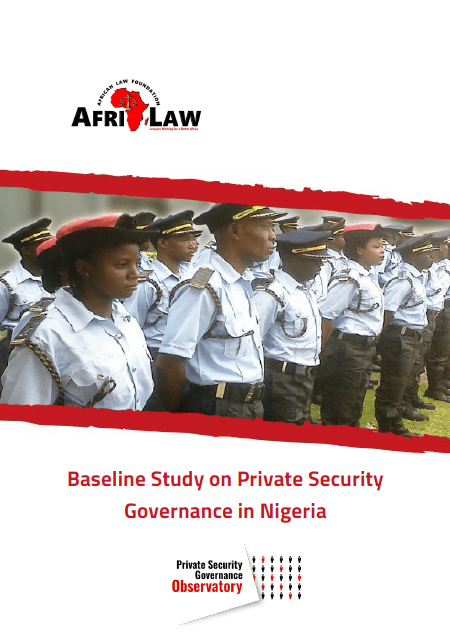Regulation and Oversight
Information about National Regulations and Regional and International Initiatives.
Nigeria
Private security operations in Nigeria have grown exponentially over the past few decades, just as the nation has experienced the proliferation of internal security challenges at the national and subnational levels across the country. On February 2019, there were about 1110 licensed private guard companies operating in Nigeria, and about 740 unregistered private guard companies under processing and yet to start operations.
In 2018 alone, registered private security companies employed as much as 828,505 persons compared to 791,210 employed by 1,058 companies in 2017 and 771,478 employed by 964 companies in 2016.
Main law regulating private security: PRIVATE GUARD COMPANIES ACT NO. 23 OF 1986
Key Information |
|
Nigeria is not a participant to the Montreux Document |
|
Sector Size (2019)
|
Can PSC personnel carry firearms?
|
International Code of Conduct Association (ICoCA)
|
Voluntary Principles on Security and Human Rights
|
Summary
In Nigeria, the demand for private security services in complementing the conventional security establishments has risen over the last decade. A rising tide of insecurity has been targeting government installations, private business and the public places, both within the region (Lake Chad region) and across the county (such as insurgency in the North East, kidnappings in the South and South East to bank robberies in the South West) putting a major strain on public security forces such as the Police, Army, Nigerian Security and Civil Defense Corps (NSCDC) and the Department of State Services (DSS). In response to this strain on public security forces, private security companies (PSCs) have become an important and increasingly prevalent supplement.
Moreover, effective monitoring and supervision by the regulatory authority of the numerous PSCs has been reported as a challenge. Poor standards of operation and professional conducts are prevalent in the industry, where a majority of PSCs suffer from poor and inadequate capacities and professionalism, resulting in many cases in unethical and unprofessional practices, potentially amounting to abuses of human rights.
Legal Framework
The current scope of regulation of the Nigerian legal framework – through the Private Guard Companies Act No. 23 of 1986– is limited only to Private Security Companies (PSCs). As such, it does not regulate neither individuals who are not employed by a PSC nor the activities or services of Private Military Companies (PMCs). The Nigerian Security and Civil Defense Corps is the legal authority overseeing PSCs in Nigeria, as provided for in the Nigeria Security and Civil Defense Corps (Amendment) Act below.
- Private Guard Companies Act No. 23 of 1986
- Private Guard Companies Regulations, 2018
- Nigeria Security and Civil Defense Corps (Amendment) Act, 2007
Challenges
The Baseline study on Private Security Governance in Nigeria, developed in 2019 by AFRILAW in the framework of the Observatory identified the following main challenges:
Regulatory and legal framework challenges
- The existence of a weak, outdated and defective Private Guards Companies Act 1986 as a regulatory framework for PSCs in Nigeria.
- Insufficient funding of the NSCDC by the federal government
- Inadequate and ineffective mechanism for regulating, supervising and monitoring PSCs operations across the country by the NSCDC.
Conflicts of interest
- Involvement of political elites and state officials in the ownership and management of the private security companies in Nigeria which can lead to abuse of regulatory processes and corruption tendencies.
- Non-existence of an independent national regulatory agency for private security companies’ operations in Nigeria.
Registration and licensing
- The high cost of registration of private security companies in Nigeria, leading to the operation of many private security companies without registration and operational license.
- High proliferation of unregistered private security companies resulting in poor standards, unprofessional conducts.
Working conditions and welfare
- General lack of job satisfaction and commitment among most private security employees’ resulting in high turnover in the private security industry in Nigeria.
- Poor attitude and unethical behaviour by many private security employees.
- Prevalent poor working environment, low salaries and allowances and non-availability of welfare support schemes for most private security company employees in Nigeria.
Human rights violations
- The inability of the NSCDC to end the proliferation and operations of many illegal and unregistered private security companies, resulting in many cases of human rights violation by illegal and unregistered private security companies.
- Low level of public awareness and stakeholders’ sensitization on private security and human rights issues in Nigeria.
Members of the Private Security Governance Observatory
- African Law Foundation (AFRILAW)
- Cem
- Children and Young People Living for Peace
- Community Policing Partners COMPPART
- Foundation For Environmental Rights, Advocacy & Development (FENRAD)
- Keen and Care Initiative
- New Nigeria Foundation
- Partners West Africa Nigeria (PWAN)
Baseline Study on Private Security Governance in Nigeria
Download PDF Here


